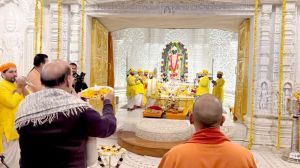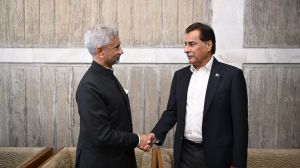Mullahs and Musharraf
On the face of it, Pakistan president Pervez Musharraf8217;s address to nearly 2,000 religious scholars and leaders emphasising that religi...

On the face of it, Pakistan president Pervez Musharraf8217;s address to nearly 2,000 religious scholars and leaders emphasising that religious extremism must be eliminated from Pakistan and seeking an end to jihad is quite a remarkable development. Considering that the troika of Musharraf, Mullahs and the Military have long influenced Pakistan8217;s jihadi orientation, his appeal to the mullahs to reverse the jihadi culture that seems to be consuming the country is quite significant. The cynics would naturally recall the many promises made by Musharraf since he took over power in October 1999. On a number of occasions he has publicly declared that no terrorism would be permitted from Pakistani territory. He has also exhorted people to give up jihad through violence. It is also true that Pakistan is full of its paradoxes 8212; even when it concerns its national interest.
But the context in which Musharraf has appealed to the mullahs is what enhances the salience of his Friday8217;s address. Pakistan is under heavy pressure and Musharraf himself has been targeted by terrorists and suicide bombers, escaping with his life and limb by a hair8217;s breadth each time. Pakistan has come under severe pressure on account of its nuclear proliferation enterprises, even if Musharraf claims that Pakistan is a 8220;responsible country8221; and is not involved in nuclear proliferation. At the same time, he has emphasised that 8220;in Islam, there is great importance of accepting the authority of the government of the day 8212; otherwise every body starts working on his own agenda8221;. He emphasised that Pakistan has to work hard on improving its conduct and image of an intolerant, irresponsible society that is 8220;spreading the culture of jihad in neighbouring states8221;.
His speech to the clergy lends some credibility to recent reports that the government has told the jihadi groups to 8220;pack up and leave8221;. He has cautioned that if Pakistan does not address the global concern that it was the hub of terrorism and is a nuclear proliferator, Pakistan could be ostracised internationally and even come under military attack. Pakistan now has to 8220;prove to the world that we are a moderate Islamic country8221;, he emphasised. A great deal of what he has argued for applies in the context of domestic terrorism and the hunt for Al Qaeda which would intensify as the snows melt. But its effect on jihadi terrorism in India needs to be closely studied. Every pressure on rolling back jihadi culture and terrorism would no doubt demoralise the groups operating in India especially at a point of time when India-Pakistan relations are on the mend, the domestic situation in J038;K is steadily improving, and the New Delhi-Hurriyat dialogue is under way.
- 01
- 02
- 03
- 04
- 05































